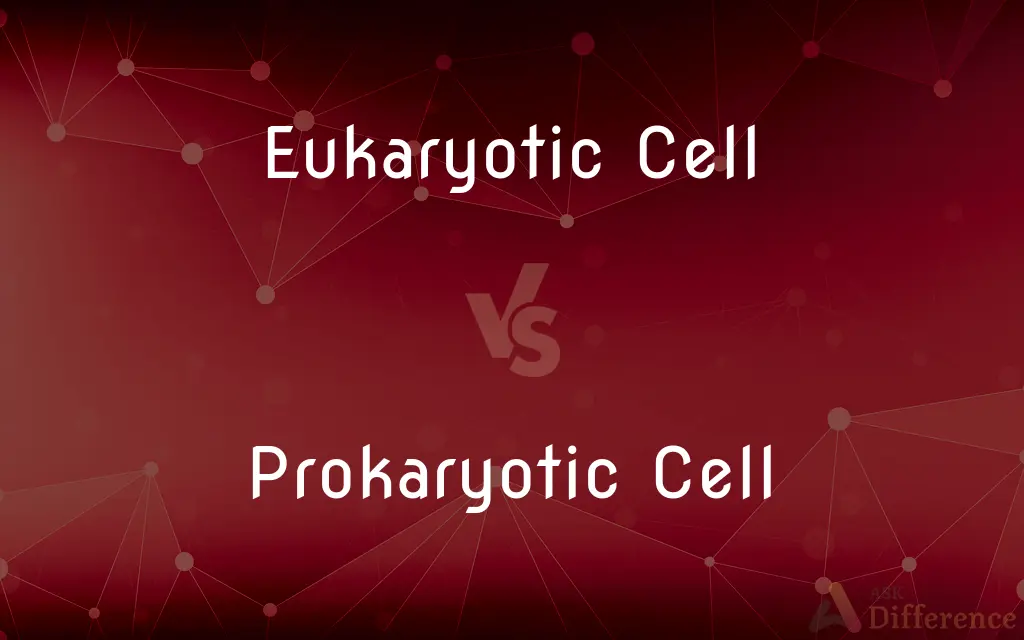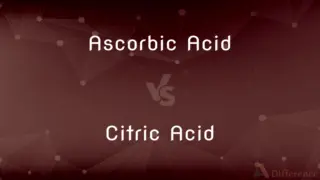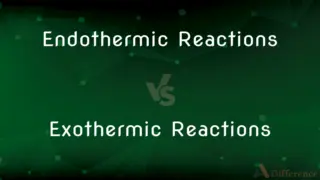Eukaryotic Cell vs. Prokaryotic Cell — What's the Difference?
By Tayyaba Rehman — Published on October 7, 2023
Eukaryotic cells have a nucleus and membrane-bound organelles; prokaryotic cells lack these structures.

Difference Between Eukaryotic Cell and Prokaryotic Cell
Table of Contents
ADVERTISEMENT
Key Differences
Eukaryotic cells are characterized by the presence of a nucleus which houses the cell's DNA. In contrast, prokaryotic cells do not have a true nucleus; instead, their DNA floats freely within the cell.
Another distinguishing feature is the presence of membrane-bound organelles in eukaryotic cells, such as the mitochondria, Golgi apparatus, and endoplasmic reticulum. Prokaryotic cells lack these specialized structures.
Eukaryotic cells are generally larger and more complex than prokaryotic cells. While eukaryotic cells can form multicellular organisms like plants, animals, and fungi, prokaryotic cells are typically unicellular, like bacteria.
The cellular division is also different between the two. Eukaryotic cells divide through mitosis or meiosis, while prokaryotic cells reproduce through a process called binary fission.
In terms of evolution, eukaryotic cells are believed to have evolved later than prokaryotic cells, with the latter being one of the earliest forms of life on Earth.
ADVERTISEMENT
Comparison Chart
Presence of Nucleus
Contains a true nucleus with DNA.
No true nucleus; DNA floats freely.
Organelles
Has membrane-bound organelles.
Lacks membrane-bound organelles.
Size & Complexity
Generally larger and more complex.
Smaller and simpler.
Cell Division
Uses mitosis or meiosis.
Uses binary fission.
Evolutionary History
Evolved later, forming multicellular organisms.
Earlier life forms, typically unicellular.
Compare with Definitions
Eukaryotic Cell
A cell with a true nucleus.
Human cells are examples of eukaryotic cells.
Prokaryotic Cell
No membrane-bound organelles.
The DNA in a prokaryotic cell is not contained within a nucleus.
Eukaryotic Cell
Forms multicellular organisms.
Plants are composed of eukaryotic cells.
Prokaryotic Cell
Divides via binary fission.
When a prokaryotic cell reproduces, it splits into two.
Eukaryotic Cell
Contains membrane-bound organelles.
The mitochondria in a eukaryotic cell produce ATP.
Prokaryotic Cell
Typically unicellular organisms.
E. coli is a type of prokaryotic cell.
Eukaryotic Cell
Divides via mitosis or meiosis.
During reproduction, a eukaryotic cell can undergo meiosis.
Prokaryotic Cell
Represents primitive cellular evolution.
Prokaryotic cells are some of the earliest life forms on Earth.
Eukaryotic Cell
Represents advanced cellular evolution.
Fungi are formed from eukaryotic cells.
Prokaryotic Cell
A cell lacking a true nucleus.
Bacteria are examples of prokaryotic cells.
Common Curiosities
Are prokaryotic cells more complex than eukaryotic cells?
No, prokaryotic cells are simpler and lack many structures found in eukaryotic cells.
Which cell type has membrane-bound organelles?
Eukaryotic cells have membrane-bound organelles.
How do prokaryotic cells reproduce?
Prokaryotic cells reproduce via binary fission.
Are humans made of prokaryotic or eukaryotic cells?
Humans are made of eukaryotic cells.
How do eukaryotic cells divide?
Eukaryotic cells divide through mitosis or meiosis.
Which cell type is typically multicellular?
Eukaryotic cells can form multicellular organisms.
Do eukaryotic cells have a true nucleus?
Yes, eukaryotic cells have a true nucleus containing DNA.
Which cell type is larger in size?
Eukaryotic cells are generally larger than prokaryotic cells.
Do prokaryotic cells have mitochondria?
No, prokaryotic cells lack mitochondria.
What organisms are primarily made of prokaryotic cells?
Bacteria and archaea are primarily made of prokaryotic cells.
Share Your Discovery

Previous Comparison
Ascorbic Acid vs. Citric Acid
Next Comparison
Endothermic Reactions vs. Exothermic ReactionsAuthor Spotlight
Written by
Tayyaba RehmanTayyaba Rehman is a distinguished writer, currently serving as a primary contributor to askdifference.com. As a researcher in semantics and etymology, Tayyaba's passion for the complexity of languages and their distinctions has found a perfect home on the platform. Tayyaba delves into the intricacies of language, distinguishing between commonly confused words and phrases, thereby providing clarity for readers worldwide.
















































